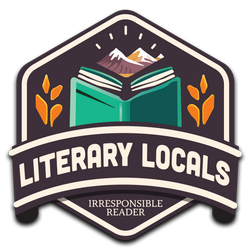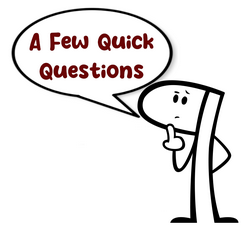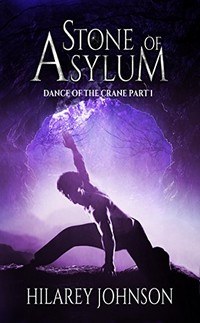
I really want to thank Hilarey Johnson for stopping by to take part in this–especially as she had to take time from fighting technological calamity to do so. She’s got some thoughtful things to say, and I hope (slash-expect) that this won’t be the last time we hear from here here.
Before we get into things, why don’t you give the reader a brief introduction to you and your work.
My name is Hilarey Johnson. I bought my website long before I realized most writers would use their full name. So you can normally find me at Hilarey.com because of the unique spelling. However, I recently had a technical mishap. I probably will not have the website rebuilt until summer 2023. Additionally, I am not active on social media and deleted most accounts several years ago. I have six novels. I wrote a coming of age literary fiction series called Breaking Bonds. The three novels complement each other, but you don’t need to read all of them to understand the stories. They have elements of faith and suspense, and a tiny bit of romance. The first two, Sovereign Ground and Heart of Petra, won several awards including Idaho Author Awards, Christian Writers Guild, and Meridian Writes from the public library. The last one is titled Sworn to the Desert.
I also have a historical fantasy series set in Idaho, 1865. Because I met my husband through martial arts, and we taught a Korean martial art called Tang Soo Do many years in Meridian, I was often encouraged to write a book with those elements. Dance of the Crane Series is a single story, told in three parts. The individual titles are Stone of Asylum, The Reckoner’s Blade, and Heiress of Coeur d’Alene. Most people who’ve seen Kung Fu Panda understand that martial arts forms are patterned after animal characteristics. My idea was that not all who came here during the gold rush were argonauts. Some were looking for the rare Idaho Star Garnet so they could transform into animals through its power and the practice of martial arts. The antagonists in my story found a way to harness the power and tattoo the pulverized stone onto others, causing them to transform into animals against their will. It’s a retelling of The Count of Monte Cristo, sort of in the vein of The Forbidden Kingdom, which is a Jackie Chan movie I like. I had a lot of fun researching that. I traveled to the Chinese Historical Museum in San Fransisco, as well as museums in Coeur d’Alene.
A question for you: Your website is very expansive. How long have you been writing your blog? Have you written anything else? Also, you’re a pretty eclectic reader. Is reading your main focus?
I started this back in 2013 (oh, I should start planning something for the 10th anniversary!). Definitely! I’ve dabbled in short stories and novels since childhood—have produced very little that I liked/wanted to work with long enough to get in publishable form. Yeah, “eclectic” is a pretty good term to use—far more complimentary than “always chasing a new shiny” or something. And yeah, reading is my main non-work focus, at this point, it’s a hobby that’s really gotten out of hand.
Writers love readers! I’m glad you used the word “work.” It’s easy to romanticize the idea of writing, but the actual work is re-writing. I don’t know that chasing a shiny something is bad. I just finished What about the Baby? by Alice McDermott, and her experience following the muse instead of the book she had contracted to write worked to her benefit. Her editor liked more as well. Sometimes that is part of finding your voice, too.
What brought you to Idaho in the first place? What is it about Idaho that keeps you here?
We came here for my husband’s job. I was born in California and graduated from high school in Lake Tahoe. I went to school in northern California and then lived in Eastern Europe the first year we were married. We moved back and forth over the California/Nevada border several years and landed in Idaho in 2003. We lived in Twin Falls five years, and moved to Boise in 2008. Because I’d moved so much in my life, I was eager to grow roots. I try not to say what I will and will not do—but I hope to stay in the area. I love the access to natural resources and bumping into people I know at the grocery store. I have a strong community here.
Are you tied into some sort of local author/bookish group/culture? If so, tell us about it and how it helps you as an author. If you’re not, is there a reason for it?
My local community and critique group are the main reason my novels became available instead of rotting in a drawer. I had written alone for many years. In fact, it took me ten years to complete my first 50,000 word novel. Then I spent five years seeing if I could do it again. The second novel landed closer to 75K. Both experiences were valuable to finish a something with continuity and a story arc. But they also helped me develop my voice. At that time, I still introduced myself as a “wannabe writer” even though I had two finished novels, written for newspapers, and had short stories published. That’s a difference community makes. In 2005, I joined a nationwide writers group called American Christian Romance Writers. I didn’t write romance but went to a conference and started attending their local chapter, Idahope Christian Writers. Most of the local members did not write romance exclusively. The next book I finished (Sovereign Ground) was completed in one year and I chose to self-publish in 2014. I remained involved in Idahope several years. They have since become inactive, but I have a secret to tell you: One of the previous presidents and I, along with a few board members, are planning to relaunch as ICW in October 2023. I’m very excited to rekindle the fellowship of writers in the valley who feel faith is an essential part of their creative process, whether they write “Christian” books or not.
I have two follow-ups to this answer (and one could probably launch a separate conversation). Beyond helping you finish “something with continuity and a story arc” and developing your voice, did these groups push you to do anything other than put the books in the drawer? Or were you just looking for something good enough to avoid the drawer in the first place? If so, how did they help you?
I think the greatest help was the shared experience of sending to editors/publishers and getting rejected, but trying again. Seeing other people be brave makes you braver. And of course just the practicality of asking advice and questions from people a step ahead of you. Some people can go to writers’ groups for years and never finish more than that first (perfected) chapter (which is perfectly fine!) but there is usually a call to step forward which you hear a little clearer when you are in a group who is also pursuing it.
Secondly, how do you see faith as an essential part of your process? (this probably belongs in a different Q&A since we’re shifting topics, but I don’t care)
I kind of hoped you would just let that slide by… First, I don’t think writing as a believer in God means you replace “the muse” with “the divine.” You still have to wrestle with The War of Art. Second, it doesn’t mean you just write about God. I have read beautiful novels by people who probably would not have considered themselves believers in God—yet they are real, raw, etherial and eternal. So for me, my faith being an essential part of the creative process includes one: I feel like I am spending time with the creator when I create, coming alive to be who he made me. Two: there is a sense of something beyond me and bigger than me at work/play. (I know people who don’t consider themselves religious also experience this. I just attribute it to God.) And three: I have a call to submit myself. This doesn’t mean just that I “have to write,” but I will flourish when I write with honesty and obedience. I think those three apply whether you write for a living or you write for yourself.
What kind of events in the area do you attend—either to sell/promote your books or to network with authors? Are there any outside of this area that you hit regularly and wish we had something like it here?
Right after I published the Dance of the Crane Series, I sort of disappeared. I didn’t promote it, I pulled back from all social media and fiction writing. It was a season of rest and repair while I figured out some personal things. So, I have been inactive in the larger writing community for many years. When I was ready to write again, I felt a stronger pull to back to nonfiction, so I spent time ghostwriting near death experiences for Guideposts. Last year, in 2022, I blogged weekly about faith, wrestling religious assumptions, mandated righteousness, mental health and authentic community. I called it “Intimacy with God for the Over-Churched.” I’d blogged for more than a decade prior, but that was an important experience, both doing it weekly and learning to record and edit audio. Of course, I recently deleted the entire thing…
During the shutdown I recorded my first novel and loved the experience. I’m working on my second right now. I hope my future in storytelling will have more to do with audiobooks. Also, this year I intend to put more energy into ICW. As I said, our goal is to connect people who specifically feel faith in God is part of their creative process. Our particular hope is to create a safe place for all forms of story. The first group I ever joined emphasized romance, but that was hard for me because even though I think a little romance sweetens every story, it isn’t my go-to genre. In ICW, we want to foster all forms of fiction, poetry, nonfiction, screenwriting, narration, podcasting… storytelling. We are so new, I don’t even have a website to send potential members. But when it is ready you will find us at idahopechristianwriters.org. Hopefully you’ll have me back in the late summer when it’s time to announce ICW.
Audiobooks aren’t something I’ve really talked about with anyone for this series—I’m assuming you self-produce the whole thing? That’s a whole different level (or seven) of complication to the publishing process. How is your first being received? Or…is it?
I read the first book but paid Audio Lab Recording Studios to produce it. I will produce the next one, which means I can spend more time perfecting it…and also means I can get lost in “never good enough, try once more” land. It’s available at the library, Audible, Spotify. It has been well received, and I am confident the next one will be better.
What’s the breakdown of your audience—do you have a strong local base, or are your readers from other parts of the world?
I sold so few books last year that I wouldn’t say I currently have a fan base—other than the cheerleaders in my life who’ve already read my books. The thing about writing fiction for a living is that you need to continue to produce. It’s also wise to pick a genre and foster that community. My second series was very different, and darker, than my first. I lost readers through that shift. I had a very loyal following on my blog. I think I will reject my own advice and publish nonfiction in line with that, next.
Do you think there are particular challenges or advantages to being a writer in the Treasure Valley? (possibly both)
There’s the assumption that you need to live in Hollywood to produce screenplays, and on the East Coast to access big publishing houses. I think the challenge or advantage would be in your personal goals. You can definitely live on less money here than in either of those two places. Also, I think it’s essential to really know the place you set your books. A strong setting can be a character, and I honestly don’t know that most of the US is interested in Idaho. Our wild lands and independent spirit are fine for westerns. But it seems that people are really drawn to the sass of southern fiction, powerful urban settings, or the charm of quaint mid-west towns. I would be curious to hear other opinions about that though.
Do you bring Idaho (or some sort of Idaho-sensibility, assuming one exists (you mean any sensibility  ?) to your work? Whether or not anyone else sees it, can you look at some aspect of your writing and think “That’s Idaho” or “I would do ____ differently if I was a Kentuckian or from Illinois?”
?) to your work? Whether or not anyone else sees it, can you look at some aspect of your writing and think “That’s Idaho” or “I would do ____ differently if I was a Kentuckian or from Illinois?”
I certainly bring my northwest-sensibility to writing. I didn’t realize this though, until I met writers from east of the Mississippi at conferences. We don’t wear gloves to church and it isn’t an unspoken requirement for pastor’s wives flat-iron their hair out here. We have less propriety in the Northwest, and I love that—even if I don’t usually realize it. Your entire experience is consciously or unconsciously woven into your writing. My first series was set in Reno, Nevada because that’s where I lived when I started hearing their voices in my head. The heroine was a dancer and we drove by strip clubs and the Mustang Ranch regularly—it was the best place to set it because of the culture.
When I wrote my series set in Idaho, I spent lots of time in the car between Twin Falls and Boise imagining the canyons, rivers, hot springs and ridges during the 1800s. It fostered a great love of our landscape inside me. Some of the sentiments, prejudices and lore of the time came from research. Research and imagination make it possible to write about places you haven’t been. Otherwise we wouldn’t have books about other planets. But I think my Idaho-sensibility definitely affected the final story. A sentiment I found researching said that people landed here only if they were out of money or options. That still intrigues me.
One final question, is there a book (or two…or 18, if you get really carried away), that embodies Idaho/the Idaho spirit to you to recommend to my readers?
This is interesting because “spirit” is more than “setting.” When we first moved here we listened to an audiobook called Monster, by Frank Peretti. It’s about a woman who has a stutter (it’s relevant to her story) and gets kidnapped by a female Sasquatch who recently lost a baby. She and her family group (a big male and another female with a living offspring) are running from something. I think it comes to mind first because we didn’t know the area and Idaho was new and exciting to us. Uncharted wilderness is very romantic to me, in theory—I’m not a survivalist. The way the character yelled at God about the unfairness of her situation was a pivotal moment in my reading/writing journey. I hadn’t yet read something which talked about faith in God with anything other than blissful acceptance. I think it captured Idaho for me because of the honesty, the wilderness, and because some people here are hiding, or running, from monsters.
Most respondents to this have either gone super-literal “this takes place in Idaho” or have gone with the “spirit” angle like you. I read Monster a long time ago, and don’t know if I’d have characterized it as Idaho-ish, but you’re absolutely right. That’s a great way to think about the answer.
Thanks for your time and participation! Hope you enjoyed it!










